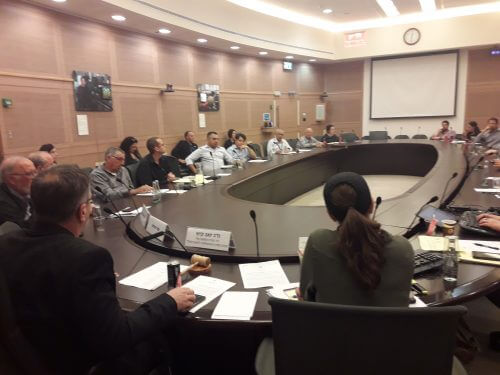The Director General of the Ministry of Science and Technology Peretz Wezan announced that the Ministry will work to promote the construction of a satellite owned by the State of Israel to be built in the Israeli space industries

In the discussion that took place on Monday in the subcommittee on space in the Knesset, Vezan stated that the ministry is ready to allocate additional budgets to the issue: "The Ministry of Science was willing to put one shekel for another in order to allow the committee's conclusions to be acted upon. Other parties were not ready to get into the issue."
The ministry's recommendation continues the line established by the Space Committee headed by the Director General of the Ministry of Science Peretz Vezan in December 2016. Among the committee's recommendations: an addition of NIS 120 million per year to the budget of the Israel Space Agency in the Ministry of Science. The supplement will be given for: development of satellites and projects in space; Establishing an array of four active communication satellites at the same time and supporting the development of products in the space industry that will compete in the global market.
According to the committee's report: "An array of communication satellites strengthens Israel's communications redundancy and security during an emergency." It was further determined that the State of Israel has a vital need for independent capabilities to obtain information and transmit it through Israeli communication satellites.
According to the recommendations of the committee, the best plan that takes into account all the needs in front of the cost to the state, is the use of commercial communication satellites made in Israel and operating them through an Israeli company. Since the cost of communication satellites made in Israel is higher than their cost on the world market, the committee states that it is necessary to draw up an outline that will enable the development of infrastructure and capabilities in order to bridge the cost gap.
In the discussion held in the Knesset regarding the state of the Israeli satellite industry and after it was discovered that The state managed to raise less than half of the amount needed for the construction and operation of Amos 8, said the chairman of the committee, MK Yoav Kish (Likud), to the representatives of Halal Communications"You have government clients, but don't be sure that they will stay with you, because the government can decide to keep the technical knowledge in Israel and you may find yourself in quite a blessing. Despite the statements in the committee, no budgeting will be done and the government ministries will not put their hand in to solve the issue and find the money."

Yossi Weiss, CEO of the Aerospace Industry, He said: "I have been warning for 10 years about the situation and there is a lot of talk, but the bottom line is that the space company unilaterally decided to contract with a foreign company. We are investing quite a bit of money from our side and parallel to the budget outline, we are running forward so that we don't get stuck. Gone are the days when we are a classic government company and we are a business company. We will not take trades at a loss. We respond to every configuration and make every effort to give a competitive offer, but when we make a satellite every 4-3 years there is no way we will be competitive against companies that have their fixed line and receive ongoing government support. The amounts offered are minimal and thus it is impossible to build a space industry. The government ministries, despite the decision of the committee headed by the Director General of the Ministry of Science, do not lift the glove. A year and a half has passed since the decision and in the meantime there are promises to allocate less than 50% of the committee's conclusions. We are being separated from all the data of the negotiations and as an industry the field of space is far beyond Amos 8. If there is no Amos 8 the knowledge we have accumulated will be lost, the ability to maintain the cutting edge of technology in the field of observation satellites will be affected, and we will continue to open gaps with the countries around us. In the graph of investment in the civil sector, we are deep in the lower part of the list compared to the countries of the world. We are going down a slope with no clear end."
Moshe Golani, VP of Engineering at Halal Communications, said in the discussion: "Contrary to what was said, we cannot withdraw from the agreement with L'Oreal. Space Communications previously ordered 4 satellites from Israel Aerospace Industries and two from outside, so we see no obstacle to returning to Israel Aerospace Industries in the future. In order not to face a broken trough in Amos 9 and 10, we need to invest today in the development components that were missing in Amos 8 so that we can prepare for an Israeli project accordingly. Things are progressing fast, two or three years after Amos 8 is launched, we will have to launch Amos 3. In "Slot" - at the point of the sky, there are many assets and it is obviously central to the communication satellite. The slot belongs to the state but it grants a concession. Our company has registered all rights in 4W point. We kept the sky points and when you register with the ITU (the World Telecommunication Organization subordinate to the United Nations) it is not enough because if within a few years you do not put technology that transmits, you lose the point in favor of the next in line. It is not only Amos 7 that must be replaced by Amos 8 quickly, but also to create a backup for Amos 3 which is in the sky and is approaching the end of its life in a few years."
See more on the subject on the science website:
